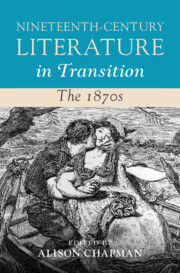Book contents
- Nineteenth-Century Literature in Transition: The 1870s
- Nineteenth-Century Literature In Transition
- Nineteenth-Century Literature in Transition: The 1870s
- Copyright page
- Contents
- Figures
- Contributors
- Acknowledgements
- Introduction
- Chapter 1 The 1870s and the Invention of Victorian Literature
- Chapter 2 Media Technologies, the Organisation of Knowledge, and 1870s Literary Culture
- Chapter 3 Assembling the 1870s
- Chapter 4 Feminism, Reform, and the Professional Woman Writer in the 1870s
- Chapter 5 The ‘High Victorian’
- Chapter 6 Middlemarch, High Realism, and the Victorian Everyday
- Chapter 7 The Post-sensational Seventies
- Chapter 8 The Shock of Aestheticism
- Chapter 9 ‘Verses, Good and Bad’
- Chapter 10 The Comings and Goings of High Victorian Nonsense
- Chapter 11 Transforming Pages
- Chapter 12 Literature, Science, and the Voice of the 1870s
- Chapter 13 A ‘sweet especial rural scene’? Nature, Culture, and Agriculture in the 1870s
- Bibliography
- Index
Chapter 13 - A ‘sweet especial rural scene’? Nature, Culture, and Agriculture in the 1870s
Published online by Cambridge University Press: 30 January 2025
- Nineteenth-Century Literature in Transition: The 1870s
- Nineteenth-Century Literature In Transition
- Nineteenth-Century Literature in Transition: The 1870s
- Copyright page
- Contents
- Figures
- Contributors
- Acknowledgements
- Introduction
- Chapter 1 The 1870s and the Invention of Victorian Literature
- Chapter 2 Media Technologies, the Organisation of Knowledge, and 1870s Literary Culture
- Chapter 3 Assembling the 1870s
- Chapter 4 Feminism, Reform, and the Professional Woman Writer in the 1870s
- Chapter 5 The ‘High Victorian’
- Chapter 6 Middlemarch, High Realism, and the Victorian Everyday
- Chapter 7 The Post-sensational Seventies
- Chapter 8 The Shock of Aestheticism
- Chapter 9 ‘Verses, Good and Bad’
- Chapter 10 The Comings and Goings of High Victorian Nonsense
- Chapter 11 Transforming Pages
- Chapter 12 Literature, Science, and the Voice of the 1870s
- Chapter 13 A ‘sweet especial rural scene’? Nature, Culture, and Agriculture in the 1870s
- Bibliography
- Index
Summary
This chapter argues that what Gerard Manley Hopkins termed the “rural scene” provided a focal point in the 1870s for profound changes in the Victorian understanding, valuation, and transformation of the natural world. British writing at this time demonstrates a shift from viewing the rural scene as picturesque landscape, as evidenced in provincial novels such as George Eliot’s Middlemarch, to conceiving of it as an environment encompassing human and nonhuman nature, notably in Richard Jefferies’ nature writings and Thomas Hardy’s first Wessex novels. Grasping the full scope of Victorian responses to the rural scene in the 1870s also requires looking to the expanding pastoral industries of the settler empire. Writing in and about the settler colonies of Australia and New Zealand, by Lady Barker, Rolf Boldrewood, and Anthony Trollope, highlights how a perceived absence of rural aesthetic values helped render colonial nature available for transformation and subsequent economic exploitation.
Keywords
- Type
- Chapter
- Information
- Nineteenth-Century Literature in Transition: The 1870s , pp. 274 - 294Publisher: Cambridge University PressPrint publication year: 2025

